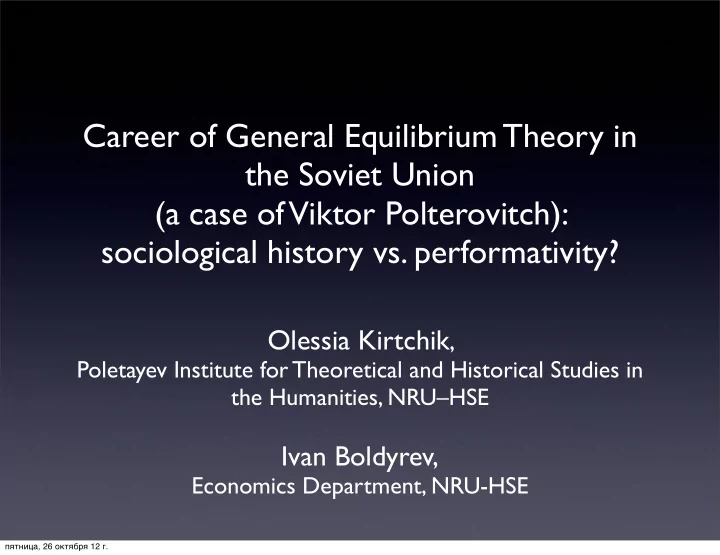

Career of General Equilibrium Theory in the Soviet Union (a case of Viktor Polterovitch): sociological history vs. performativity? Olessia Kirtchik , Poletayev Institute for Theoretical and Historical Studies in the Humanities, NRU–HSE Ivan Boldyrev, Economics Department, NRU-HSE пятница , 26 октября 12 г .
Research and educational group for Social Studies of Economic Knowledge • Boldyrev Ivan • Fursov Konstantin • Kurakin Alexander • Rud Vitaly • Assalauova Dana • Averyanova Anna • Grachev Denis • Malkov Egor • Martynenko Petr • Ushakov Alexey • Zaripov Ian (http://igiti.hse.ru/en/socres/ – National research university ‘Higher school of economics’) пятница , 26 октября 12 г .
“ The story of ‘equilibrium’ is one in which empirical work, ideas of facts and falsification played no role at all ” (Weintraub, E. Roy. 1983. “On the Existence of a Competitive Equilibrium: 1930-1954.” Journal of Economic Literature 21(1): 1–39). “ The mathematical economics – or pure mathematics – is conceived to have no history ” [...] “the most stubbornly internalistic subfield of the history of science” ( Weintraub, E. Roy and Philip Mirowski. 1994. “The Pure and the Applied: Bourbakism Comes to Mathematical Economics.” Science in Context 7(2): 245–272). пятница , 26 октября 12 г .
Questions of this study: – What were the favorable/ limiting conditions for the development of the GE theorizing in the Soviet context? – How was this theory interpreted in terms of the Soviet economy? What political-economic problems did it address? – And, finally, what influence did it have on the Soviet economic science and policy? пятница , 26 октября 12 г .
Development of the GET • Léon Walras ( Elements of Pure Economics, 1870s): • In perfectly competitive markets consumers demand equals producers supply for all goods; • Equilibrium prices are reached through a trial-and-error process in the market exchanges (“tâtonnement”). • Axiomatization and formalization of the GET (1930s - 1950s) • Arrow–Debreu–McKenzie model (1950s): • joint proof by Gérard Debreu and Kenneth Arrow of the existence of a general competitive Walrasian equilibrium, 1954; • Lionel McKenzie, 1959; • Gérard Debreu, Theory of Value (1959). пятница , 26 октября 12 г .
The “performative effects” of the General Equilibrium Theory • Influence on the economic knowledge: • the Walrasian model became the core of mainstream “neo-classical” economics • high standards of the mathematical rigor • Ideological impact: • the GET perceived as a proof of the superiority of capitalism over socialism пятница , 26 октября 12 г .
Mathematical economics in the Soviet Union during the Cold War (since the late 1950s) • “Optimization theory” (Leonid Kantorovich) • Optimal planning, optimal allocation of resources, activity analysis, input-output tables • General equilibrium theory • Arrow/Debreu models, disequilibrium, dynamics, computable models • Game theory • Complex systems, etc. пятница , 26 октября 12 г .
Institutional niches of a relative intellectual autonomy • Optimization considered as a topic of strategic importance by the Soviet authorities (Economic Reform of the mid-1960s); • A highly technical mathematical language inaccessible to “profanes”; • An access to the Western up-to-day literature; contacts with Western scholars. пятница , 26 октября 12 г .
Career of Viktor Polterovitch (Born in 1937 in Moscow) • 1962: a diploma in engineering from the Moscow Oil and Gas Institute; • 1962-1966: an engineer at the Institute of Automation of Oil and Gas Industry (Moscow); • 1962-1966: a complete course at the Department of Mechanics and Mathematics of the Moscow State University; • 1966-now: a researcher at the Central Institute of Mathematics and Economics, Moscow. пятница , 26 октября 12 г .
Evolution of the works of Viktor Polterovitch on the GET • 1966-1970: the problem of optimization of the Soviet economy; • 1970s: equilibrium analysis within the Soviet context of optimal planning (to defend decentralizing decisions); • 1980s: disequilibrium technics to analyze Soviet practices of rationing and phenomena of market imperfection (queues, deficit, black markets) пятница , 26 октября 12 г .
Reasons for a belated and limited reception of the GET in the Soviet context • Intellectual (predominance of optimal planning based mainly on linear programming); • Ideological (socialist framework and a traditional distrust of mathematical economics as “bourgeois science”); • Institutional (a relative isolation from the Western academia; a separation of the GET from the established economic research institutions in the USSR). пятница , 26 октября 12 г .
Conclusive remarks • Formal mathematical models (applied to economics) cannot be “simply” transferred to a new institutional and intellectual context: a work of interpretation and adaptation. • The GET, in the Soviet Union, has been often perceived not as an abstract descriptive model but a practical tool, especially for planning. • Mathematical economic models are not inherently performative; they may be occasionally performative when mobilized by actors, in favorable conditions. • In the Soviet case, a failure to transform the planning system because of a general hostility to the ideas of decentralization and market socialism. пятница , 26 октября 12 г .
Recommend
More recommend